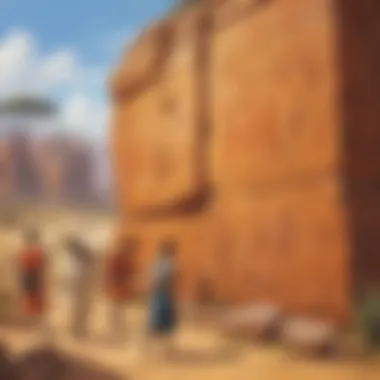Exploring Africa: Valuable Educational Insights for Young Minds


Interactive Learning Games
Africa offers a plethora of engaging interactive learning games that can captivate young minds and enhance their cognitive abilities. From traditional games like Mancala to modern educational apps, African games provide a unique blend of entertainment and knowledge acquisition. Exploring popular games such as 'Morabaraba' and 'Diketo' can expose children to diverse cultural elements while sharpening their strategic thinking and problem-solving skills. Through detailed descriptions of top educational games indigenous to different regions of Africa, children can immerse themselves in the rich tapestry of African folklore and history. The benefits of playing these games extend beyond entertainment, fostering critical thinking, spatial reasoning, and collaborative skills essential for children's cognitive development. In-depth game reviews will guide parents and educators in selecting games that effectively balance gameplay enjoyment with valuable learning outcomes, offering a thorough comparison of how different games contribute to enhancing children's knowledge and skills.
Educational Topics
Delving into educational topics from Africa unlocks a treasure trove of knowledge spanning various subjects like math, science, languages, and more. The compilation of articles covering these diverse topics emphasizes the importance of interdisciplinary learning for a well-rounded and holistic development approach. By integrating lessons from African cultures and environments into educational curricula, children gain a broader perspective and understanding of the world around them. Exploring mathematical concepts through traditional African counting systems or unraveling scientific phenomena unique to the continent fosters a sense of curiosity and exploration, encouraging young minds to become global citizens with a multifaceted awareness of different disciplines.
Tips and Tricks
Parents and educators can leverage practical tips and tricks drawn from African educational experiences to enhance children's learning journey. Strategies such as storytelling, role-playing, and hands-on activities can transform mundane lessons into engaging and interactive experiences that inspire a love for learning. By incorporating music, dance, and art into educational practices, caregivers can create a dynamic and stimulating environment that fuels children's imagination and creativity. These tailored approaches not only make learning fun and engaging but also cater to individual learning styles, maximizing the educational benefits for children of varying interests and abilities.
Creative DIY Projects
Engaging children in creative DIY projects not only nurtures their artistic talents but also enhances cognitive and motor skills development. Step-by-step guides detailing these projects offer comprehensive instructions for parents, teachers, and caregivers to facilitate hands-on learning experiences. The benefits of engaging in DIY activities extend beyond artistic expression, promoting problem-solving, fine motor skills, and a sense of accomplishment. By exploring craft ideas that utilize simple household items, children can unleash their creativity while fostering a sense of resourcefulness and environmental consciousness. Encouraging artistic expression in children's development through DIY projects cultivates a sense of pride in their creations and nurtures a lifelong passion for creativity and self-expression.
Introduction to Africa
In this insightful section of the article, we delve into the profound significance of introducing young minds to the diverse continent of Africa. The inclusion of 'Introduction to Africa' serves as a crucial foundation for understanding the continent's geography, history, culture, and wildlife. By unraveling the unique elements of Africa, children can broaden their global perspective and develop a deeper appreciation for the world's diversity. The exposure to Africa from an educational standpoint offers a gateway to stimulating curiosity, fostering empathy, and nurturing a sense of interconnectedness with the global community.
Geography and Diversity
The African Continent
The African continent stands out as a remarkable focal point in this article, showcasing a myriad of landscapes, climates, and ecosystems. Its vast size and diverse topography contribute to its status as a geographical marvel, offering an array of habitats to various plant and animal species. The African continent's unique feature lies in its unparalleled biodiversity, making it a prime choice for exploration and ecological studies within the context of this article. Its richness in natural resources and ecological importance provide valuable insights for young minds to appreciate the intricate balance of nature and the significance of conservation efforts.
Ecological Zones
In exploring the ecological zones of Africa, we uncover the intricate web of life that spans across its different habitats. From lush rainforests to expansive savannahs, each ecological zone presents a distinct set of flora and fauna, reflecting the continent's ecological diversity. The focus on ecological zones enriches the overall understanding of Africa's environmental characteristics, highlighting the interconnectedness of various ecosystems and the importance of preserving biodiversity for future generations. By immersing oneself in the study of ecological zones, young learners can grasp the complexity of environmental dynamics and the need for sustainable practices to ensure the preservation of natural habitats.
Cultural Regions
Within the tapestry of Africa's cultural landscape, distinct cultural regions offer a glimpse into the rich tapestry of traditions, languages, and customs that define each community. The exploration of cultural regions unveils the intricacies of African societies, illustrating the diversity of practices, beliefs, and artistic expressions across different regions. By investigating cultural regions, children can gain a deeper appreciation for the multifaceted nature of African heritage and the values that underpin community life. Understanding cultural regions fosters cross-cultural awareness and promotes respect for cultural diversity, instilling valuable lessons in tolerance and global citizenship for young minds.
Cultural Insights
In this article, the focus on Cultural Insights opens a gateway to understanding the diverse and rich traditions that Africa embodies. Cultural Insights offer a profound exploration into the essence of various customs, beliefs, and practices that shape the unique identity of different African societies. Through Cultural Insights, young minds can gain a deep appreciation for the heritage and history that define Africa as a reservoir of cultural wealth and diversity.


Traditional Practices
Celebratory Festivals
Delving into Celebratory Festivals provides a colorful glimpse into the vibrant spirit and communal celebration that characterizes African cultures. These festivities are not merely entertainment but vital expressions of cultural pride, unity, and heritage. The key characteristic of Celebratory Festivals lies in their ability to bring people together, fostering a sense of community and shared identity. Their inclusion in this article holds significant value as they showcase the joy, creativity, and cultural richness that young minds can learn from and enjoy. The unique feature of Celebratory Festivals is their power to transcend barriers and ignite a sense of belonging, making them an invaluable choice for highlighting the cultural vibrancy of Africa within this educational context.
Artistic Expressions
Artistic Expressions in African cultures serve as powerful conduits for storytelling, expression, and preservation of heritage. Through various art forms like music, dance, and visual arts, African communities convey their histories, beliefs, and emotions. The key characteristic of Artistic Expressions is their ability to transcend language barriers and communicate profound messages through creativity. Their presence in this article is crucial as they offer young learners an insight into the cultural depth and creative prowess of African societies. The unique feature of Artistic Expressions lies in their capacity to inspire imagination, provoke thought, and nurture appreciation for diverse forms of artistic expression.
Local Cuisine
Exploring the realm of Local Cuisine exposes young minds to the flavors, ingredients, and culinary traditions that reflect the geographical and cultural richness of Africa. Local Cuisine is not just about food; it is a sensorial experience that encapsulates history, community, and identity within each dish. The key characteristic of Local Cuisine is its ability to showcase the fusion of flavors, techniques, and narratives that define regional gastronomy in Africa. Its inclusion in this article is vital as it provides a taste – quite literally – of African culture, offering young learners a sensory journey into the diverse culinary landscape of the continent. The unique feature of Local Cuisine lies in its capacity to evoke memories, stimulate curiosity, and cultivate a respect for the gastronomic diversity present across Africa.
Languages and Communication
Diverse Linguistic Landscape
Diving into the Diverse Linguistic Landscape unravels the linguistic tapestry that underscores the multilingual nature of Africa. With over 2,000 languages spoken across the continent, Africa stands as a beacon of linguistic diversity and cultural heritage. The key characteristic of the Diverse Linguistic Landscape is its role in preserving historical narratives, folklore, and identity markers within each language spoken. Its significance in this article lies in enlightening young minds about the importance of language as a cultural symbol and a gateway to understanding diverse societies. The unique feature of this aspect is its ability to foster respect for linguistic differences, promote language preservation, and encourage cross-cultural communication among young learners.
Oral Traditions
The exploration of Oral Traditions delves into the art of storytelling, historical recollection, and knowledge transmission through verbal narratives in African societies. Passed down from generation to generation, oral traditions preserve myths, legends, and communal histories that elucidate the cultural fabric of Africa. The key characteristic of Oral Traditions is their role in connecting individuals to their past, fostering a sense of continuity and belonging within communities. Their inclusion in this article is essential as they offer young minds a window into the narrative richness and oral heritage that define African cultures. The unique feature of Oral Traditions is their capacity to captivate listeners, impart wisdom, and immortalize ancestral knowledge through the spoken word.
Modern Communication
In the realm of Modern Communication, the fusion of traditional and contemporary communication channels in Africa underscores the dynamic evolution of how information is shared and disseminated. From social media platforms to mobile technology, Modern Communication reflects the adaption of global trends in local contexts, shaping new modes of interaction and connectivity. The key characteristic of Modern Communication is its role in bridging geographical distances, facilitating instant connections, and amplifying voices across diverse communities. Its significance in this article lies in showcasing to young learners the transformative power of communication technologies in shaping societal dynamics and cultural exchanges. The unique feature of Modern Communication is its potential to empower youth, amplify diverse voices, and foster cross-cultural dialogues through digital mediums.
Family and Community Values
Ubuntu Philosophy
Exploring the Ubuntu Philosophy unveils a fundamental African belief centered around interconnectedness, empathy, and shared humanity among individuals. Ubuntu, often summarized by the phrase 'I am because we are,' underscores the essence of community, collective responsibility, and human solidarity within African societies. The key characteristic of Ubuntu Philosophy is its emphasis on compassion, respect, and communal harmony as pillars of ethical living. Its inclusion in this article is critical as it imparts young minds with a profound moral philosophy that promotes empathy, social cohesion, and mutual respect. The unique feature of Ubuntu Philosophy lies in its potential to instill values of kindness, inclusivity, and equity, fostering a sense of interconnectedness and empathy among young learners.
Community Collaboration
Delving into Community Collaboration sheds light on the collaborative spirit, resource-sharing, and communal problem-solving approaches that define African communities. Collective efforts, mutual support networks, and shared responsibilities are intrinsic elements of community collaboration, driving societal advancement and cohesion. The key characteristic of Community Collaboration is its ability to leverage collective wisdom, promote sustainable development, and nurture a sense of belonging within neighborhoods and societies. Its presence in this article is significant as it demonstrates to young learners the power of unity, cooperation, and shared goals in achieving common objectives for community well-being. The unique feature of Community Collaboration is its capacity to engender social capital, build trust, and inspire active engagement among individuals towards collective progress and shared prosperity.
Respect for Elders


The concept of Respect for Elders embodies a profound cultural value found across various African societies, emphasizing reverence, wisdom-seeking, and intergenerational knowledge transfer. Elders hold a central role as custodians of tradition, moral compasses, and pillars of guidance within communities. The key characteristic of Respect for Elders is its promotion of intergenerational solidarity, wisdom dissemination, and continuity of cultural practices. Its inclusion in this article is crucial as it underscores the importance of valuing the experiences, teachings, and contributions of older generations in shaping societal norms and values. The unique feature of Respect for Elders lies in its potential to nurture respect, instill humility, and preserve collective memory among young learners, fostering a culture of appreciation for the wisdom and legacy of previous generations.
Wildlife and Conservation
In this section, we delve deeply into the pivotal theme of Wildlife and Conservation, a critical aspect of the diverse continent of Africa. Understanding the significance of preserving wildlife and natural habitats is paramount in educating young minds about their role in environmental stewardship. By exploring the unique ecosystems and animal species of Africa, children can gain a profound appreciation for the delicate balance of nature.
Biodiversity Hotspots
Serengeti Ecosystem
The Serengeti Ecosystem stands out as a remarkable focal point in the discourse on Wildlife and Conservation within the African landscape. Its sprawling plains and diverse wildlife populations make it a cornerstone of conservation efforts on the continent. Children can learn about the migratory patterns of creatures like wildebeests and zebras, showcasing the interconnectedness of ecosystems in sustaining biodiversity. The Serengeti's role in promoting ecotourism and raising awareness about conservation makes it a prime example for young minds to grasp the importance of preserving natural habitats.
Okavango Delta
Moving on to the Okavango Delta, this unique wetland system in Botswana captivates both researchers and nature enthusiasts alike. Its seasonal flooding cycle creates a haven for an array of flora and fauna, contributing significantly to the region's biodiversity. Exploring the Okavango Delta would allow children to understand the intricate relationships between water availability and wildlife survival. Moreover, the conservation efforts around this fragile ecosystem underscore the collaborative measures required to protect and sustain such critical habitats.
Madagascar Rainforests
The Madagascar Rainforests present a distinct realm of biodiversity, offering a treasure trove of endemic species found nowhere else on the planet. From vibrant chameleons to elusive lemurs, this ecosystem showcases the evolution of unique organisms in isolation. Introducing children to the beauty and fragility of these rainforests can inspire a sense of responsibility towards protecting Earth's natural wonders. By highlighting the conservation challenges faced by Madagascar's rich biodiversity, young minds can grasp the urgency of preserving these irreplaceable ecosystems.
Conservation Efforts
Transitioning to the proactive realm of Conservation Efforts, it becomes evident that safeguarding Africa's wildlife and habitats requires concerted actions from individuals, communities, and governments. By shedding light on various initiatives, children can appreciate the multifaceted approach needed to address pressing conservation issues.
Anti-Poaching Initiatives
The fight against poaching is a critical component of wildlife conservation across Africa. Through anti-poaching initiatives, organizations and governments strive to protect endangered species like elephants and rhinos from illegal hunting. Educating children about the detrimental effects of poaching on biodiversity can instill a sense of empathy and advocacy for wildlife protection. Discussing the innovative strategies employed in anti-poaching efforts can inspire young minds to actively participate in conservation endeavors.
Protected Areas
Protected areas play a pivotal role in preserving biodiversity hotspots and critical habitats throughout Africa. By designating specific regions as protected, conservationists ensure the safeguarding of endemic species and ecosystems from human encroachment. Introducing children to the concept of protected areas fosters an understanding of the need for designated spaces to allow nature to thrive in its undisturbed state. Highlighting the success stories of protected areas can motivate young learners to champion for the expansion of conservation territories.
Community-Based Conservation
Community-based conservation strategies empower local populations to become stewards of their natural heritage. By involving communities in conservation decision-making processes, initiatives can achieve sustainable outcomes that benefit both people and wildlife. Educating children about the collaborative efforts between communities and conservation groups can foster a sense of shared responsibility in safeguarding the environment. Exploring the synergies between human well-being and biodiversity conservation can offer young minds a holistic perspective on environmental sustainability.
Endangered Species


As we shift our focus to Endangered Species, it becomes imperative to address the precarious status of iconic fauna and flora in Africa. By illuminating the challenges faced by species on the brink of extinction, children can grasp the urgent need for conservation actions to preserve Earth's irreplaceable biodiversity.
Rhinos and Elephants
The plight of rhinos and elephants due to poaching and habitat loss underscores the relentless pressures faced by these majestic animals. Understanding the pivotal roles of these species in maintaining ecosystem health can sensitize young learners to the far-reaching consequences of their decline. By delving into the characteristics and behaviors of rhinos and elephants, children can develop a profound connection to the intrinsic value of wildlife conservation.
Critically Endangered Primates
Africa's forests harbor a diversity of primate species, many of which are facing critical endangerment due to deforestation and illegal wildlife trade. Exploring the unique adaptations and social structures of these primates can engender empathy and respect for these sentient beings among children. Learning about the challenges in protecting critically endangered primates can prompt young minds to advocate for sustainable practices and forest conservation to ensure the survival of these vulnerable species.
Marine Conservation
The marine ecosystems along Africa's coasts are home to a plethora of marine species, from colorful corals to majestic marine mammals. Emphasizing the importance of marine conservation can help children understand the interconnectedness of terrestrial and aquatic environments. By exploring the challenges faced by marine conservationists, such as overfishing and pollution, young learners can appreciate the fragility of ocean ecosystems and the urgent need to mitigate human impacts. Education on marine conservation can inspire children to become advocates for sustainable fishing practices and marine biodiversity protection.
Colonial History Impact
In this article, the Colonial History Impact section delves into the crucial importance of understanding Africa's colonial past and its implications for the continent's present and future. By examining the enduring effects of colonization, young minds can discern the complexities of historical events and their lasting impact on African societies.
Legacy of Colonization
Cultural Influence
The Legacy of Colonization encompasses a multifaceted analysis of Cultural Influence, shedding light on how colonial encounters shaped and influenced African traditions, practices, and belief systems. This subsection elucidates the intricate ways in which European colonization introduced new cultural norms, values, and languages to Africa, profoundly altering indigenous societies. By exploring this aspect, children can grasp the nuances of cultural exchange, hybridization of traditions, and the preservation of heritage amidst external influences. Understanding the Cultural Influence provides insights into the richness and diversity of African cultural expressions, promoting a deeper appreciation for the continent's heritage.
Economic Consequences
Within the discourse on the Legacy of Colonization, the Economic Consequences section uncovers the profound impact of colonial economies on African nations. It elucidates how exploitative practices such as resource extraction, forced labor, and economic dependency perpetuated by colonial powers continue to resonate in contemporary economic systems. By dissecting these implications, young learners can comprehend the unequal distribution of wealth, persistent poverty cycles, and the challenges of economic development post-independence. Exploring the Economic Consequences fosters critical thinking about economic structures, resource management, and sustainable development in Africa.
Social Fragmentation
In the realm of Social Fragmentation, the discussion revolves around the divisive legacies of colonial rule on African societies. It highlights how colonial policies that favored certain ethno-cultural groups over others bred discord, tribal conflicts, and social stratification within nations. By examining this facet, children gain insights into the complexities of nation-building, ethnic tensions, and the importance of fostering social cohesion in diverse societies. Understanding Social Fragmentation prompts reflections on unity, reconciliation, and the enduring need for inclusive social policies to heal historical wounds and promote social harmony.
Independence Struggles
Nationalist Movements
The Independence Struggles section illuminates the heroic battles fought by African nations to reclaim sovereignty and self-governance from colonial rule. It delves into the fervent Nationalist Movements that mobilized masses, sparked revolutions, and catalyzed the decolonization process across the continent. By exploring this aspect, young readers grasp the significance of national identity, self-determination, and collective agency in shaping post-colonial Africa. Understanding the Nationalist Movements instills a sense of pride, resilience, and empowerment in youth, inspiring them to champion justice, equality, and freedom in their communities.
Post-Independence Challenges
Within the discourse on Independence Struggles, the Post-Independence Challenges segment delves into the complexities and hurdles faced by newly independent African nations. It unravels the socio-economic, political, and developmental obstacles that emerged post-independence, ranging from nation-building efforts to governance struggles and economic stabilization endeavors. By analyzing these challenges, children develop a nuanced understanding of the complexities of state-building, democratization processes, and sustainable development pathways. Exploring Post-Independence Challenges equips young minds with critical perspectives on modern African realities, fostering empathy, and promoting innovative solutions to overcome persistent challenges.
Modern Governance
The Independence Struggles section culminates with a focus on Modern Governance in contemporary Africa, examining the evolution of governance frameworks and practices across the continent. It elucidates the diverse governance models, institutional reforms, and accountability mechanisms adopted by African nations to enhance transparency, efficiency, and public participation in decision-making processes. By delving into this domain, young readers gain insights into the complexities of governance, democratic principles, and civic engagement crucial for fostering accountable and inclusive societies. Exploring Modern Governance cultivates a sense of responsibility, civic awareness, and participatory citizenship in the next generation of African leaders and changemakers.















